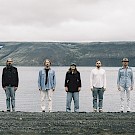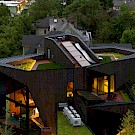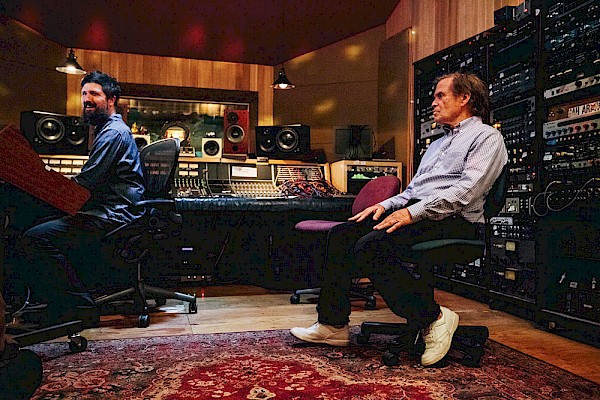 Tucker Martine and his father Layng Martine Jr. at Flora Recording & Playback in 2015Some great studios have been named for the streets on which they reside. Both London’s Abbey Road and Daniel Lanois’ Grant Avenue inspired studio owner Tucker Martine to take a cue from these storied houses that recorded The Beatles and U2, respectively.
Tucker Martine and his father Layng Martine Jr. at Flora Recording & Playback in 2015Some great studios have been named for the streets on which they reside. Both London’s Abbey Road and Daniel Lanois’ Grant Avenue inspired studio owner Tucker Martine to take a cue from these storied houses that recorded The Beatles and U2, respectively.
“My first proper basement studio in Seattle was on Flora Avenue,” the Nashville-born producer says sitting in his wood-clad control room. His dad, Layng Martine Jr., was a songwriter in Music City’s recording industry—penning tunes for Elvis Presley, The Pointer Sisters and Reba McEntire—and “was deep in the thick of it when I was growing up,” which meant Martine spent plenty of time around some legendary spaces.
“The recording studio environment completely captured my imagination,” Martine says of his youth. “It’s kind of a magical place filled with all these mysterious machines.”
After a stint in Colorado, Martine headed to Seattle in ’92, seeking “a place that had a more diverse music community”—one that now counted jazz guitarist Bill Frisell and keyboardist Wayne Horvitz as residents alongside the grunge uprising. And there, Flora Recording & Playback was born.
In a time when operating a professional recording studio is a precarious business venture, Flora has never been solely defined by a specific address.
“I came down here [Portland] to work on a Decemberists record,” says Martine of tracking The Crane Wife alongside Death Cab for Cutie’s Chris Walla in 2006. “It was summertime and somehow I just convinced myself that if I lived here it would be a beautiful summer day every day.”
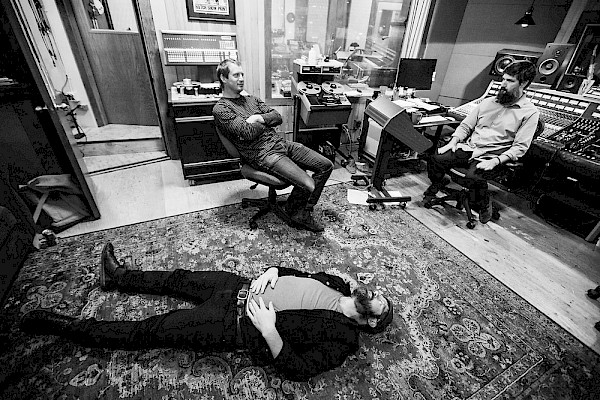 The Decemberists and Martine hard at work on the collaborative Offa Rex album in fall of 2016Martine has gone on to record four more albums for Stumptown’s literary folk rockers and admits, “I probably would not of moved here had it not been for them.”
The Decemberists and Martine hard at work on the collaborative Offa Rex album in fall of 2016Martine has gone on to record four more albums for Stumptown’s literary folk rockers and admits, “I probably would not of moved here had it not been for them.”
Walla was his introduction to the band. “He lived here for a short spell but then he moved away and I got to keep making records with them. Over time, I got more nestled into the music community.”
That sense of solidarity extends to other producers, engineers and studio owners in Portland. “In some ways, this might be one of the best cities in the world to live in for a community amongst recordists,” Martine tells. He pays homage to Larry Crane of Jackpot! Recording Studio and the bimonthly engineering bible Tape Op magazine. “I really feel that everybody has each other’s back. It’s like you’re borrowing sugar or eggs from your next-door neighbor,” Martine says of the practice of lending and borrowing gear amongst studio folk. “I think we all just feel what’s good for one of us is good for all of us.”
As a producer, Martine looks “for situations where I feel like I’ll have something valuable to contribute.” But he always starts by asking lots of questions and listening to artists. It’s not about “what I would do because it’s really their art and their vision.” Martine helps clarify that sonic signature and, ideally, pushes artists to a place “that I think they would like to go, whether they have yet realized it or not.”
“I try to zero in on what I think is unique about them as an artist and highlight that because I feel more than ever that the world doesn’t need just another record or just another artist or songwriter,” he says. “They need unique voices and if you’re gonna throw another record out into the world, hopefully it brings something original to the party.”
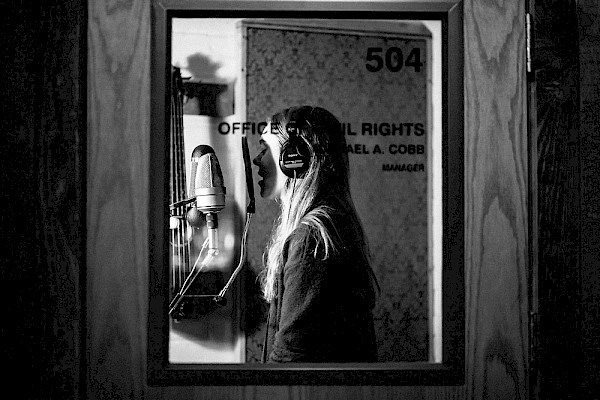 Johanna Söderberg of First Aid Kit recording vocals for 'Ruins' in early 2017The space he’s created, physically and mentally, has drawn an impressive roster to record with him, including R.E.M., Sufjan Stevens, First Aid Kit, Rosanne Cash, and the supergroup case/lang/veirs, which features Neko Case, k.d. lang and, Martine’s wife, Laura Veirs—not to mention numerous locals like Modest Mouse, Blind Pilot, The Domestics, Fruition, and M. Ward. Even Microsoft asked him to compose a “three-second sound” that was used as the startup chime for its Vista operating system.
Johanna Söderberg of First Aid Kit recording vocals for 'Ruins' in early 2017The space he’s created, physically and mentally, has drawn an impressive roster to record with him, including R.E.M., Sufjan Stevens, First Aid Kit, Rosanne Cash, and the supergroup case/lang/veirs, which features Neko Case, k.d. lang and, Martine’s wife, Laura Veirs—not to mention numerous locals like Modest Mouse, Blind Pilot, The Domestics, Fruition, and M. Ward. Even Microsoft asked him to compose a “three-second sound” that was used as the startup chime for its Vista operating system.
Flora is literally stacked with many hundreds of instruments and various pieces of gear. From a “beater upright piano” with “a fun history” (originally owned by Keith Moon, then traded to Rick Danko of The Band—“apparently for drugs”—and finally bought off Danko by Ian McLagan of the Faces) to an Indian harmonium to umpteen pedals and mics, “I feel like having a lot of different instruments around, especially the kind of funkier things that people aren’t likely to bring, they inspire people,” Martine says. “When they’re working on songs, they end up tinkering and finding a cool place for some of these weird instruments on songs.”
Whether recording in basements, a barn at Pendarvis Farm (for The Decemberists’ The King Is Dead—watch some behind-the-scenes footage below), a Louisville church gymnasium (for My Morning Jacket’s Circuital), or his own custom-built NoPo warehouse space, Martine is finally ready to fully control his own destiny.
“I’m actually going to be moving the studio later in the year, which I didn’t see coming,” he reveals. “But my wife and I were able to buy this little spot that’s closer to our house.”
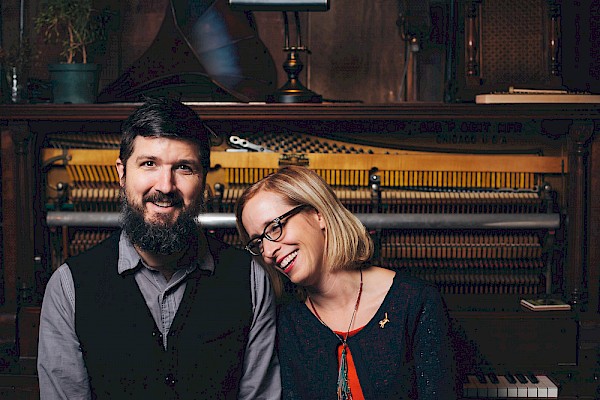 Martine and wife Laura Veirs at Flora Recording & PlaybackThat spot is the old clubhouse for the notorious Gypsy Joker Motorcycle Club on MLK in NE Portland. Architect and acoustician Derek Trost will again direct the design, ultimately creating “a more spacious version” of Martine’s current digs—which means you can bet that natural light, salvaged barn wood (providing “instant comfort”), and atmospheric lighting will be priorities, plus there’ll be a backyard hang zone, kitchen and sleeping quarters to go with the great-sounding rooms.
Martine and wife Laura Veirs at Flora Recording & PlaybackThat spot is the old clubhouse for the notorious Gypsy Joker Motorcycle Club on MLK in NE Portland. Architect and acoustician Derek Trost will again direct the design, ultimately creating “a more spacious version” of Martine’s current digs—which means you can bet that natural light, salvaged barn wood (providing “instant comfort”), and atmospheric lighting will be priorities, plus there’ll be a backyard hang zone, kitchen and sleeping quarters to go with the great-sounding rooms.
Hoping to move into the new space come late summer, he’s well aware that there may be delays. And once he settles in, we’re confident that Martine will once again show that he’s not bound by location. “Every time out, I want to be challenged,” he says. “And I want to surprise myself and find myself doing things I didn’t necessarily know I could do.”

